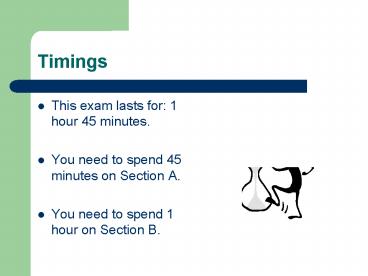Timings - PowerPoint PPT Presentation
1 / 16
Title:
Timings
Description:
Timings. This exam lasts for: 1 hour 45 minutes. You need ... enjambment. assonance. onomatopoeia. sibilance. pathetic fallacy. stanza. alliteration. Finally. ... – PowerPoint PPT presentation
Number of Views:44
Avg rating:3.0/5.0
Title: Timings
1
Timings
- This exam lasts for 1 hour 45 minutes.
- You need to spend 45 minutes on Section A.
- You need to spend 1 hour on Section B.
2
What youre being tested on
- In this exam, you will be
- writing about
- Your prose text in Section A.
- The poetry from the Literature section of your
Anthology in Section B.
3
The prose text
- Read the question carefully.
- Underline key words so that you know exactly what
youre being asked to do. - Prepare a plan in which you write down your key
ideas or points (think PEE!). - Look through the text and select short quotations
that will back up these ideas.
4
What the examiners are looking for
- A sensitive, detailed and well-expressed response
- Comments on language
- structure
- form
- Brief quotations to support your ideas
- A willingness to explore different
interpretations and layers of meaning - A willingness to explore the effect of the
writers choices.
5
You need to think about . . .
- What important characters say, do and represent
- How characters and relationships change and
develop - The use of minor characters what function do
they serve? - How the writer uses different settings to bring
out ideas and feelings - The importance of key events in the novel
6
. . . continued . . .
- Why the writer orders events in the way that s/he
does - How the writer shows ideas, thoughts and feelings
by means of the language characters speak - How the writer shows ideas, thoughts and feelings
by the use of description - Key images, metaphors, similes in the novel
- Why the novel starts/finishes in the way that it
does
7
. . . and again!
- What you are left thinking and feeling at the end
of the novel - What you think the writer was trying to say
when writing the novel - The appropriateness or significance of the
novels title - Your own responses to the novels characters,
themes and ideas
8
The poetry
- Remember, you will be writing about either
- Simon Armitage and Carol Ann Duffy
- Or
- Seamus Heaney and Gillian Clarke
- You will also be writing about some of the
pre-1914 poems.
9
How many poems?
- You will need to write about 4 poems in this
essay. - You dont need to write the same amount on each
one. - At least one poem will be named.
10
Planning the poetry essay
- As always, read the question carefully. Some
questions have two parts to them make sure that
you read both parts. - Again, underline the key words so that you know
exactly what youre being asked to do. - As you are writing about four poems, divide your
page into four so that you can prepare a suitable
plan.
11
Planning continued
- Choose the poems carefully.
- Write down your key ideas or points (think PEE!).
- Look through the text and select short quotations
that will back up these ideas. - Look for similarities and differences between the
poems that you can comment on when youre
comparing them.
12
What the examiners are looking for
- A sensitive, detailed and well-expressed response
- Comments on language
- structure
- form
- Brief quotations to support your ideas
- A willingness to explore different
interpretations and layers of meaning - A willingness to explore the effect of the
writers choices - The ability to make suitable comparisons between
texts
13
You need to think about
- The subject matter of the poems
- The form (e.g. sonnet) and structure of the poem
- The writers use of images
- The voice that the poet uses 1st person,
personal, adopting a persona, tone of voice - The significance of sounds within the poem
14
. . . continued . . .
- The effect that the poem has upon the reader
- The effect that key words or phrases have upon
the reader - The thoughts, feelings and ideas that are being
explored in the poem - The appropriateness or significance of the title
15
Some useful poetic terms
16
Finally . . .
- Youve worked hard and now is the time to show
the examiner how knowledgeable you are. - Good Luck from
- everyone in the English Department!

